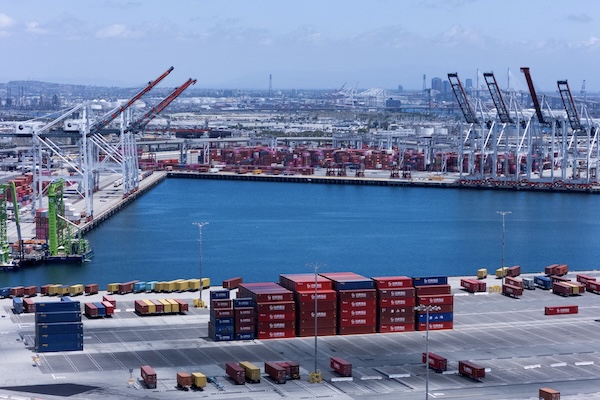 Cranes at the Port of Los Angeles are empty of cargo ships as shown with a drone at in San Pedro California, US, 13 May 2025;
Credit: Reuters, Mike Blake
Cranes at the Port of Los Angeles are empty of cargo ships as shown with a drone at in San Pedro California, US, 13 May 2025;
Credit: Reuters, Mike Blake
(Reuters) – According to a draft letter sent to negotiating partners and seen by Reuters on Tuesday 3 June 2025, the Trump administration wants countries to provide their best offer on trade negotiations by Wednesday as officials seek to accelerate talks with multiple partners ahead of a self-imposed deadline in just five weeks.
The draft, from the office of the United States Trade Representative, provides a window into how President Donald Trump plans to bring to a close unwieldy negotiations with dozens of countries that kicked off on 9 April 2025 when he paused his "Liberation Day" tariffs for 90 days until Tuesday 8 July 2025 after stock, bond and currency markets revolted over the sweeping nature of the levies.
The document suggests an urgency within the administration to complete deals against its own tight deadline. While officials such as White House economic adviser Kevin Hassett have repeatedly promised that several agreements were nearing completion, so far only one agreement has been reached with a major US trading partner: Britain. Even that limited pact was more akin to a framework for ongoing talks than a final deal.
In the draft, the US is asking countries to list their best proposals in a number of key areas, including tariff and quota offers for purchase of US industrial and agricultural products and plans to remedy any non-tariff barriers.
Other requested items include any commitments on digital trade and economic security, along with country-specific commitments, according to the letter.
The US will evaluate the responses within days and offer "a possible landing zone" that could include a reciprocal tariff rate, according to the letter.
It was unclear which countries would receive the letter, but it was directed at those with active negotiations that included meetings and exchanges of documents. Washington has been engaged in such talks with the European Union (EU), Japan, Vietnam and India, among others.
A USTR official said trade talks were ongoing. “Productive negotiations with many key trading partners continue at a rapid pace. It is in all parties’ interest to take stock of progress and assess any next steps.”
‘Regardless of ongoing litigation’
Tiffany Smith, vice president of global trade policy at the National Foreign Trade Council, welcomed the USTR moves.
"We are encouraged that USTR is moving negotiations ahead as quickly as they can," she told Reuters, adding that trade deals that removed barriers for US companies abroad and lowered US tariffs would be "a win-win if they are done in a way that returns predictability and stability to trade relationships."
Trump's ambitious - and often frenetic - tariff policy is a pillar of his "America First" economic agenda as he seeks to reshape US trade relationships, reduce trade deficits and protect American industries. Republican lawmakers are also banking on tariffs to add to federal revenue and offset the cost of the tax cut legislation now working its way through Congress.
Trump's tariff policies have taken investors on a rollercoaster ride. In May, US stocks held their biggest rally of any month since November 2023, but that was after global indexes had cratered under the barrage of Trump's tariff announcements through February, March and early April 2025.
Stocks were little changed on Monday 2 June 2025 afternoon after Trump announced a surprise doubling of tariffs on steel and aluminum imports on Monday 30 June 2025 at an event in Pittsburgh.
Meanwhile, the legality of the approach used for imposing the most sweeping of his tariffs has been cast into doubt.
Last Wednesday, the Court of International Trade ruled that Trump had overstepped his authority with tariffs devised under the International Emergency Economic Powers Act, including the "Liberation Day" levies and earlier ones imposed on goods from Canada, Mexico and China related to Trump's accusations that the three countries have facilitated the flow of fentanyl into the US. Less than 24 hours later, an appeals court temporarily paused that decision. The tariffs at the centre of the legal dispute are expected to remain in effect as the case plays out.
The draft letter to trading partners warns them not to believe the tariffs will be sidelined if the court rules against Trump's use of the IEEPA.
"Regardless of ongoing litigation concerning the President’s reciprocal tariff action in US courts, the President intends to continue this tariff program pursuant to other robust legal authorities if necessary, so it is important that we continue our discussions on these matters," the draft says.








